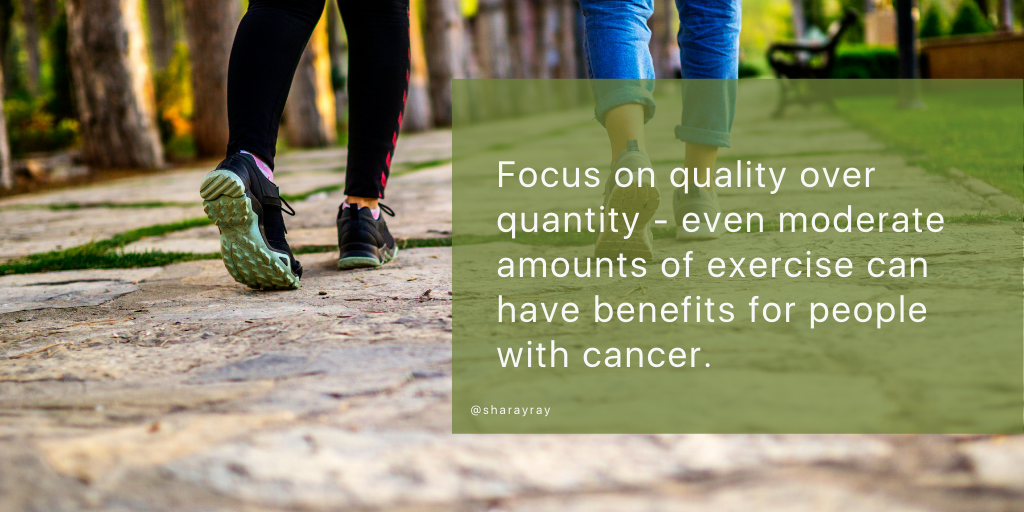Tips to Help You Get More Fit After Anal Cancer
For those who have recently been diagnosed with anal cancer, exercise may be the last thing on your mind. It's common to feel overwhelmed and unsure of what to do next.
I wrote about my experiences learning I had cancer for Cancer Wellness Magazine and my own blog. If you or someone you know is recently diagnosed with anal cancer, I would suggest reading either one of those for tips I learned during my anal cancer treatments.
Talk to your doctor about whether exercise is right for you. If so, there are some things you should keep in mind when starting an exercise program. First, start slowly and build up gradually. Secondly, choose activities that you enjoy and that fit your fitness level. And finally, focus on quality over quantity - even moderate amounts of exercise can have benefits for people with cancer.
At the beginning of treatments, try to eat healthily, stretch, and take moderate walks when you aren't sleeping. And towards the end of radiation treatments, and the few weeks after - just try to rest as much as possible to get through it all.
So what are the best types of exercise to do if you have anal cancer?
I am going to say it again — it’s important to talk to your doctor or physical therapist to get clearance before starting any kind of exercise program. Once you have the green light, start off slow.
Walking from my bed to the kitchen was a milestone I was proud of which I was able to accomplish about 2 weeks after treatment ended (prior to that I was completely bedridden with a few trips to the bathroom).
Moderate aerobic activities like walking or swimming are great options once you are feeling up for it. These activities will help increase your heart rate and oxygen levels, which can help reduce fatigue brought on by your body literally focusing all of its effort to shrink a tumor.
For me, the more I walked - even if it was slowly down the block and back - the more I felt like myself again.
Once your treatment rounds are healed, strength training is important for anal cancer survivors
In addition to aerobic exercises, strength training is also important for cancer patients. You don't have to lift weights or use those confusing bands. There are many bodyweight exercises that have helped me.
This 10-minute standing abs workout from PopSugar Fitness is a video I put on at least once a week.
Standing while working on my core is needed because I tend to get dizzy doing crunches on the ground.
Strengthening your core, glute muscles, and your hips can help to preserve muscle mass and bone density, both of which can decline during cancer treatment. This video has continued to help me as I hit 1.5 years post-cancer treatments.
It’s important to start slowly with strength training, especially if you are new to it. Talk to a personal trainer or physical therapist about the best exercises for you and how to do them correctly. Once you have the hang of things, you can begin to increase the intensity and frequency of your workouts.
A healthy diet helps improve your overall health and can also reduce your risk of recurrence and death from anal cancer. Eating plenty of fruits, vegetables, whole grains, lean protein, and healthy fats can help improve your prognosis and quality of life after being diagnosed with anal cancer. Here are some of the healthy eating tips I learned. For me - I have upped my fiber intake, but I know for many with anal cancer, they have to do the opposite, so once again - talk to your doctor. <3
Also, flexibility and balance exercises are also beneficial for those with anal cancer. Yoga, Tai Chi, and Pilates are all good options that can help improve some of the physical side effects of cancer treatment, such as fatigue, pain, joint stiffness, your range of motion, and reduce the risk of breaking a hip (and yes! post-radiation on your pelvis, this is a huge concern for anal cancer survivors).
Exercise is important for anal cancer survivors, both mentally and physically
Cancer patients often experience anxiety and depression along with their diagnosis. Exercise has been shown to help lessen these symptoms by releasing endorphins, which have mood-boosting effects. Endorphins can improve your overall outlook and make you feel happier.
Endorphins are released from your brain when you do something that's physically or emotionally stressful. For example, if you exercise intensely, your mind will release endorphins to protect your central nervous system.
If you are struggling with motivation, try working out with a friend or joining an exercise group specifically for cancer patients. It can be helpful to surround yourself with others who understand what you are going through and can offer support and encouragement.
Acupuncture helps also! I go once a month and it makes a world of difference.
Don't be afraid to get moving! Moderate exercise can go a long way in helping you to improve your quality of life. Even if you’re not feeling up for a vigorous workout, moving in some way is important for both your physical and mental health.
Try starting with a 2-minute stretch, and 8 minutes of walking and gradually increasing as you feel able.
If you (or someone you love) are newly diagnosed with anal cancer:
Here are some articles I have written on my journey. I hope I can help many people, during and after treatments. <3



